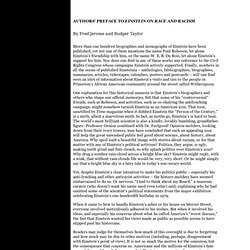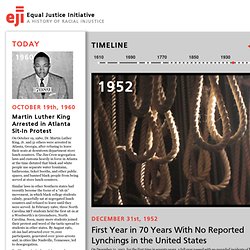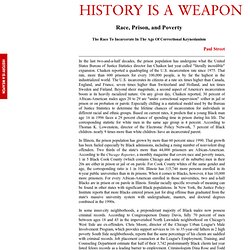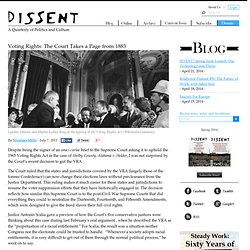

Civil Rights. The Forgotten KIng. Martin Luther King. USA - Civil Rights & Freedoms. Civil Rights Movement. Civil Rights (Divided Union) Say It Plain: Great African American Oratory - Download free content from American Public Media. Einstein on Race and Racism by Fred Jerome and Rodger Taylor. More than one hundred biographies and monographs of Einstein have been published, yet not one of them mentions the name Paul Robeson, let alone Einstein’s friendship with him, or the name W.

E. B. Du Bois, let alone Einstein’s support for him. Nor does one find in any of these works any reference to the Civil Rights Congress whose campaigns Einstein actively supported. Finally, nowhere in all the ocean of published Einsteinia – anthologies, bibliographies, biographies, summaries, articles, videotapes, calendars, posters and postcards – will one find even an islet of information about Einstein’s visits and ties to the people in Princeton’s African American community around the street called Witherspoon.
Yet, despite Einstein’s clear intention to make his politics public – especially his anti-lynching and other antiracist activities – the history-molders have seemed embarrassed to do so. James Baldwin How to Cool It - James Baldwin 1968 Freddie Gray Riots. Q.

But if industry and government seriously planned job-training programs, and the unions opened up? BALDWIN: Look, the labor movement in this country has always been based precisely on the division of black and white labor. That is no Act of God either. Labor unions along with the bosses created the Negro as a kind of threat to the white worker. There's never been any real kind of threat to the white worker. Q. BALDWIN: Educate their own rank and file. Q. BALDWIN: I'm not sure that you should be asking me these questions at all. Q. BALDWIN: No I think we've had more far more, more than enough of low-income housing which simply becomes high-rise slums. Q. BALDWIN: I don't want any more projects built in Harlem, for example.
Little rock 9. Race, Riot, and Rebellion: A Bibliography. This morning on the other side of the Atlantic, I woke up early in preparation for a seminar on William Otter, whose History of My Own Times closes the list of our readings in my Revolutionary America class.

Essentially, Otter was a brawling, violent, white man in the 1800s, living variously in New York, Pennsylvania, and Maryland. He jumped from job to job while engaging in various aggressive “sprees” against African Americans, Irishmen, and anyone else who seemed a likely candidate before becoming a burgess of Emmitsburg, Maryland.[1] And instead of getting up to prep this morning, I remained in bed, glued to the #BaltimoreUprising and #BlackLivesMatter hashtag on Twitter, as, I’m sure, were many of you during the late hours of the night.
During times like these, it’s part of our jobs as historians to acknowledge that different types of violence have specific meanings that change over time. And so Juntoists have compiled a bibliography for our mutual education. Alexander, Michelle. A History of Racial Injustice - Equal Justice Initiative. December 31st, 1952 First Year in 70 Years With No Reported Lynchings in the United States On December 31, 1952, for the first time in seventy years, a full year passed with no recorded incidents of lynching.

Race, Prison, and Poverty. The Race To Incarcerate In The Age Of Correctional Keynesianism Paul Street In the last two-and-a-half decades, the prison population has undergone what the United States Bureau of Justice Statistics director Jan Chaiken last year called "literally incredible" expansion.

Chaiken reported a quadrupling of the U.S. incarceration rate since 1975. That rate, more than 600 prisoners for every 100,000 people, is by far the highest in the industrialized world. The U.S. incarcerates its citizens at a rate six times higher than Canada, England, and France, seven times higher than Switzerland and Holland, and ten times Sweden and Finland. In Illinois, the prison population has grown by more than 60 percent since 1990. In some inner-city neighborhoods, a preponderant majority of Black males now possess criminal records. A Many-Sided Disenfranchisement Researchers and advocates tracking the impact of mass incarceration find a number of devastating consequences in high-poverty Black communities. Civilrights timeline. Voting Rights: The Court Takes a Page from 1883. Voting Rights: The Court Takes a Page from 1883 Lyndon Johnson and Martin Luther King at the signing of the Voting Rights Act (Wikimedia Commons) Despite being the signer of an amici curiae brief to the Supreme Court asking it to uphold the 1965 Voting Rights Act in the case of Shelby County, Alabama v.

Understanding Slavery - Learning Adventures. African American History: From Emancipation to the Present.